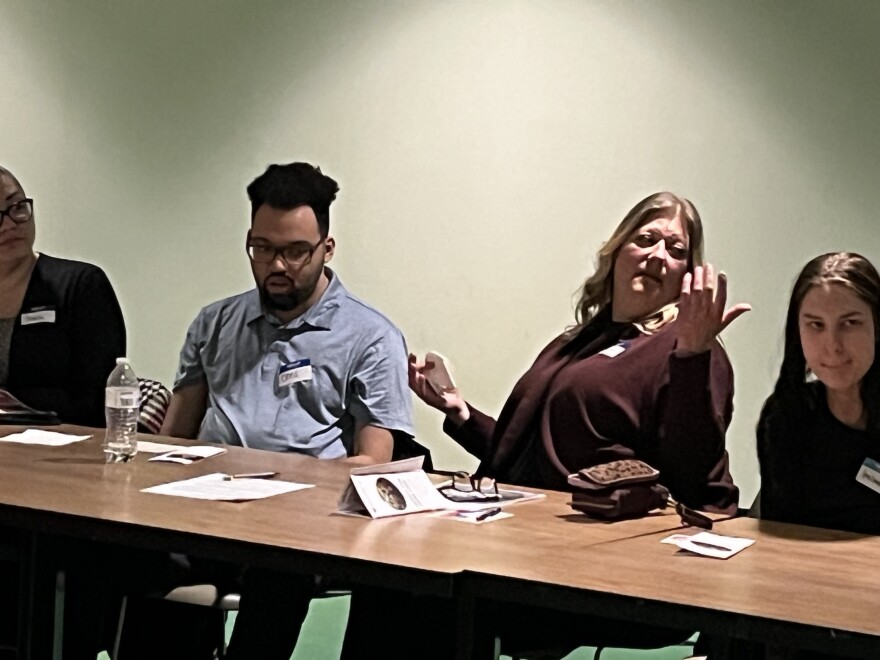ALLENTOWN, Pa. — The foundational issue of the home health care crisis revolves around addressing inadequate government reimbursement funding, officials say.
But on Thursday, Dave Totaro also talked about soul — or lack of same.
“It’s important to make sure people who need home health care get the care they deserve,” said Totaro, president of BAYADA Hearts for Home Care, an advocacy organization that works to improve the home care system.
“But without adequate reimbursement, we can’t fully staff those people. Some of them then might not be able to be cared for at home, where they want to be.
"So yes, when the government doesn’t increase funding, I wonder about their souls.”
Totaro was part of a 90-minute community roundtable discussion held by his organization at Allentown Public Library.
“Unless something is done quickly, we’re going to see more providers exit the industry.”Dave Totaro, president and executive director of BAYADA Hearts for Home Care.
The event showcased home care professionals and families reliant on home care services to discuss the critical challenges in the industry in the Commonwealth and nationwide — including workforce shortages and funding gaps.
“Everything is going up — rent, taxes,” Totaro said. “Everything but reimbursement rates.
“We have to turn down two of every three home care requests because we can’t staff them, because we can’t pay our caregivers a sustainable wage due to the low reimbursement from the state and the federal government.
“Unless something is done quickly, we’re going to see more providers exit the industry.”
Spending cuts
Pennsylvania has reached a crisis point in the lack of home health care affordability, according to Laura Ness, deputy executive director of Hearts for Home Care.
Ness also is president of the Pennsylvania Home Care Association.
“The turnover we have is that for every 10 home care workers we hire per year, eight are leaving because of money."Laura Ness, deputy executive director of Hearts for Home Care
“The turnover we have is that for every 10 home care workers we hire per year, eight are leaving because of money,” she said.
Funding for home care workers comes from the Medicaid program, enabling low-income adults who qualify for a nursing facility to stay in their own homes.
Providers assist those people with daily activities such as getting dressed in the morning, cooking meals, doing laundry and running errands.
Reimbursement funding is distributed through Medicaid. The current hourly reimbursement caregiver rate is $21.57 and $50 per hour for nursing care.
The reimbursement figures must cover the caregiver’s salary, overtime, employee training, taxes and other services.
“Many reimbursement rates have not increased in 15 years,” Ness said.
State Sen. Nick Miller, D-14th District, told the panel he understands the urgency to increase reimbursement funding.
“This is a vital service for people to stay in the comfort of their own home,” Miller said. “There are increased phone calls to my office about home care affordability.
“One in four people in Pennsylvania are over the age of 60. By 2030, it will be one in three. It’s 127 percent more expensive to go to an institution [for care] than to stay at home."
'Make sure they have quality care'
A 23% reimbursement increase has been recommended for personal assistance rates, as a result of a state Department of Health and Human Services study released in February.
“That is only a recommendation,” Ness said. “There is no increase in the governor’s budget for home care providers working under the agency model.
“That’s why we’re talking to legislators like [Miller] about it today.”
The Pennsylvania Home Care Association had hoped for a reimbursement rate increase of 23% this year and 7% in each of the following two years.
“My purpose for being here today is, that one day when I’m not here, I want to make sure they have quality care."Laura Ness, deputy executive director of Hearts for Home Care
Suzanne Hines is a 30-year nursing veteran who has performed home care nursing the past five years.
During the panel discussion, Hines was joined by a few of her four adoptive children who have developmental conditions.
She discussed the challenges and benefits of ensuring they will be cared for in a home care setting.

“My purpose for being here today is, that one day when I’m not here, I want to make sure they have quality care,” Hines said.
Her son, Christopher, nodded.
When the time comes for state lawmakers to decide on increasing reimbursement funding, all those in attendance on Thursday hope they find the money.
And the empathetic part of their souls.


